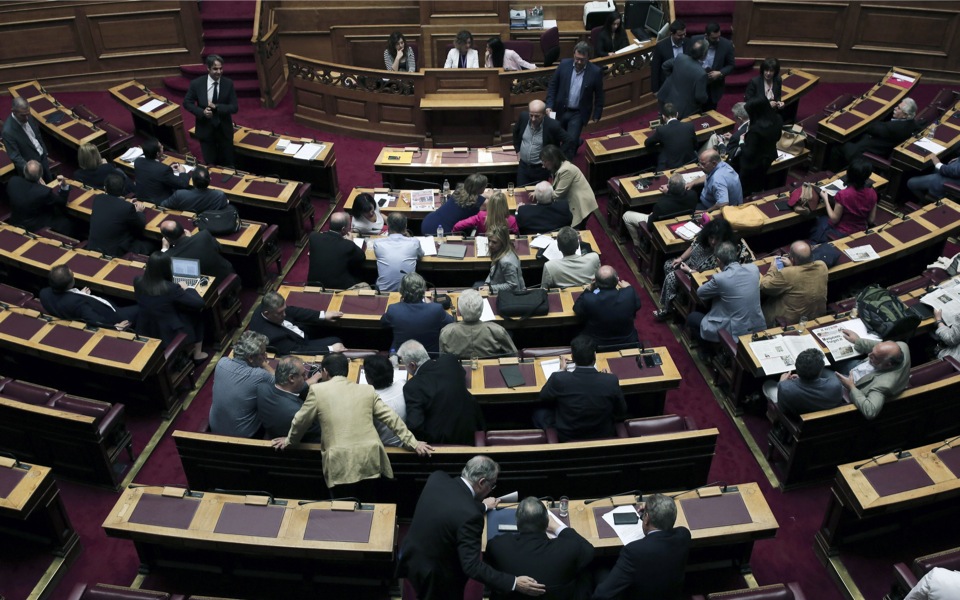Question marks hang over new gov’t

The outcome of the Sunday’s Greek election marks the second victory for the leftist SYRIZA party and its leader Alexis Tsipras in eight months and opens the way for the formation of a stable coalition government for the next three to four years. However, it is not clear whether the new government will be able to put Greece back on the road of sustainable economic growth for various reasons, including the implementation of a demanding bailout program.
Despite its breakup and the signing of a new bailout agreement in August, SYRIZA’s victory over the conservative New Democracy party represents a personal triumph for Tsipras. It shows the importance Greek voters assign to the personality of party leaders and their charisma or the lack thereof. It also points to the weaknesses of the other political parties, especially New Democracy, as far as their message and representation is concerned.
At this point, it looks as if SYRIZA could form a new government with the right-wing, populist Independent Greeks (ANEL), as before. Analysts on Sunday estimated both parties could together gather 155 seats in the 300-seat Parliament so it was up to Tsipras to choose whether he would govern with the ANEL party alone or invite a third party to join the coalition government. Readers are reminded that high-level European Union officials had expressed their preference in the past if SYRIZA were to form a government with a more moderate, centrist party – to the irritation of ANEL and SYRIZA deputies. Regardless, it is clear Tsipras remains the dominant player in Greek politics and will make up his own mind.
The election outcome and SYRIZA’s victory may be good news to Brussels as well. The prevailing view among analysts is the EU would rather see a SYRIZA-led government or a grand coalition apply the reforms and austerity measures outlined in the third bailout program rather than have SYRIZA in the opposition. The proponents of this view in Greece and abroad think it will be easier for a SYRIZA-led government to implement the program and help the country emerge from its long economic slump than the other way around.
However, others disagree with this view. First, they argue SYRIZA and Tsipras himself have not fathered the bailout program. Moreover, SYRIZA officials have often criticized it and sought amendments which may not be acceptable to the country’s lenders. So they question whether the new government will actually go ahead and implement a number of major reforms, such as privatizations. “They can pass laws in Parliament, for example, to open some professions to competition, but I doubt whether they will be able to put them to work,” observed a senior banker.
On the other hand, nobody seems to doubt the will of the new SYRIZA-led government to impose new taxes as a means to sort out the country’s public finances. However, observers note this is going to put even more pressure on the private sector, companies and individuals, making it more difficult for the economy to recover and grow at healthy growth rates in the medium to long term. To make their point, they stress Greek government bonds have rallied since the new bailout agreement was reached but the Athens stock exchange has not done so over the same period.
Indeed, the 10-year bond yield fell to 8.50 percent prior to election day from about 9.5 percent in mid-August and 19.4 percent in early July. Also, the two-year bond yield dropped to 11.3 percent from 12.3 percent in mid-August and a record 57.7 percent in early July. This reflects two factors according to the observers: first, the easing of investor concerns regarding a possible Grexit, following the signing of the bailout accord and the three-year loan from the European Stability Mechanism (ESM); and, second, fears among bondholders about a new restructuring of Greek bonds have dissipated since the new bailout loans essentially underwrite the bonds. On the other hand, the relative underperformance of Greek stocks underlines investor concerns about the prospective profitability and the financial health of Greek-listed companies. Moreover, they point out the emphasis of the bailout agreement on raising tax revenues will also hit savers. Not just individuals with bank deposits but also others who have other forms of savings, like homeowners. The prices of real estate have fallen dramatically in the last six years or so while property taxes have risen time and again over the same time span.
Finally, critics argue that SYRIZA has so far not shown to have enough experts to run public offices effectively. Therefore, it will have to recruit these professionals from the market, which may not be easy given the relatively low pay in the public sector. In addition, ideological conflicts may arise when it comes to the implementation of reforms demanded by the bailout program which run against deeply held beliefs.
We have to wait and see which side is right: those who think a SYRIZA-led government may be better suited to implement the new economic program and lead the country out of the doldrums or those who argue such a government may be stable but will not be able to deliver. The jury is out and we have to wait for the verdict.





